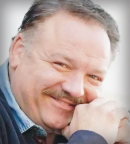You could call it a sixth sense, but the moment I felt a lump in my left breast I knew it was cancer, although it would take several weeks to confirm the diagnosis. When I saw my primary cancer physician and told him of my concern, he said: “Don’t worry. Men don’t get breast cancer; it’s a woman’s disease.” Of course, he was wrong. Although the incidence of breast cancer in men is rare—less than 1%—each year, nearly 3,000 men in the United States are diagnosed with the cancer, and more than 500 die of the disease.1
After insisting that I wanted to pursue diagnostic testing to determine the cause of the mass in my breast, the doctor reluctantly agreed and scheduled a series of imaging scans, which detected a small tumor in the breast. A tissue biopsy confirmed what I feared. I had estrogen receptor–positive, progesterone receptor–positive, HER2-negative breast cancer.

Kirby Lewis
The oncologist I met with recommended a unilateral mastectomy and the removal of several lymph nodes to test for disease spread. Fortunately, the cancer had not metastasized to nearby lymph nodes and was confined to my breast. The final diagnosis was stage 2A breast cancer. In addition to surgery, my oncologist recommended tamoxifen to reduce the level of estrogen in my body.
Dueling Health Threats
I wish I could say my experience with a potentially life-threatening disease ended there, but it turns out that, within days of learning I had breast cancer, I also found out I needed open-heart surgery to treat several blocked arteries. The heart surgery was scheduled for 3 months after the mastectomy to give my body a chance to recover, but by then, the tamoxifen had sent my triglyceride level into the stratosphere. Concerned that the rise in triglycerides would complicate the heart surgery, the operation was postponed for a few weeks while I was weaned off the hormonal therapy. Once my triglyceride level was in a safe range, I proceeded with the heart surgery. For 4 years, my health remained good, although I never completely relaxed my vigilance against a possible cancer recurrence.
Since my cancer diagnosis, I have become a patient advocate. I’ve taken the science training program in the National Breast Cancer Coalition’s Project LEAD, so I was well aware of the risks I faced. Still, when I got the news in April 2016 that the cancer had metastasized to my lungs and spine, I was devastated.
Riding the Emotional Roller Coaster of Cancer
My oncologist immediately started me on paclitaxel, and there are no words to describe how miserable and tired I felt. After 3 months on the treatment, an imaging scan showed the chemotherapy had only a small effect against the cancer, and my oncologist prescribed a series of other therapies to stop the disease from progressing: palbociclib, fulvestrant, the mTOR inhibitor everolimus, leuprolide, and the bisphosphonate zoledronic acid (to strengthen my bones). By the fall of 2016, amazingly, the combination of treatments, and I’d like to think prayer, was effective at not only halting disease progression, but imaging scans could find no evidence of disease. I was over the moon.
“My focus is on living, not dying, with cancer, and I hope I am making a difference in the lives of other cancer survivors.”— Kirby Lewis
Tweet this quote
I remained on the treatment until 2018, when an imaging scan detected a small tumor in my right lung. For the past year and a half, I’ve been on combination treatments of fulvestrant, palbociclib, and leuprolide, and the cancer is stable.
Living, Not Dying, With Cancer
Why I got this cancer is a mystery to me. There is no history of breast or ovarian cancer in my family, and I have tested negative for the BRCA1/2 gene mutation. From the time of my diagnosis, I have never been embarrassed about having breast cancer and have since dedicated my life to raising awareness of male breast cancer and reducing the stigma surrounding this disease. I’m hoping that by sharing my story, others will be encouraged to be proactive in their health care and seek medical attention at the first sign of a potential problem.
Today, my focus is on living, not dying, with cancer, and I hope I am making a difference in the lives of other cancer survivors. I’ve learned that life doesn’t stop when you get a terminal diagnosis, it gets sweeter.
Mr. Lewis lives in Berkeley Springs, West Virginia.
Editor’s Note: Columns in the Patient’s Corner are based solely on information The ASCO Post received from patients and should be considered anecdotal.
REFERENCE
1. Breastcancer.org: Male breast cancer. Available at www.breastcancer.org/symptoms/types/male_bc. Accessed October 26, 2020.

